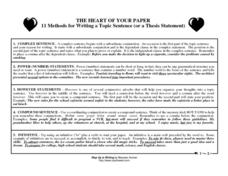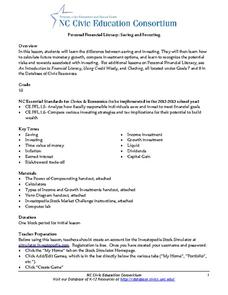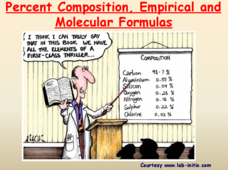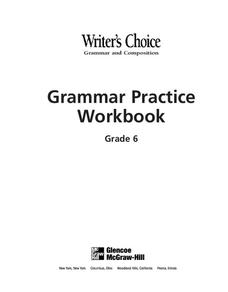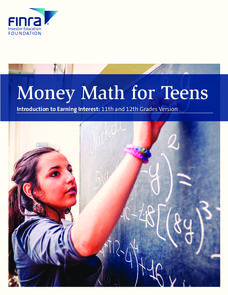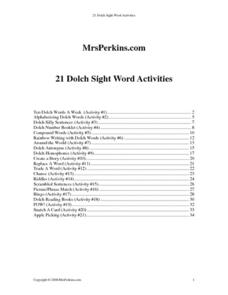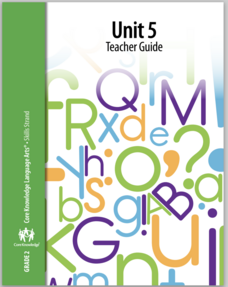Teach Engineering
Rube Goldberg and the Meaning of Machines
A Rube Goldberg machine does not really look like it would make work easier. Introduce your class to Rube Goldberg with a resource that shows how his inventions make simple tasks harder to complete.
Council for Economic Education
A Penny Saved
A penny saved is a penny earned! Scholars research the different ways to save money over a lifetime. They investigate the Rule of 72, compound interest, and sub-prime loans to gain an understanding of how banks aid in the saving process....
National Institute of Open Schooling
Chemical Arithmetics
Substances with the same empirical and molecular formula must be differentiated by their structural formula. Part two in a series of 36 has pupils using chemical formulas to calculate how much of a compound is present in a given...
Curated OER
The Heart of Your Paper: 11 Methods for Writing a Topic Sentence (or a Thesis Statement)
Help your young writers produce high-quality topic and thesis statements that go beyond basic wording and really illustrate complex ideas and critical thinking skills. From however and compound sentence statements to using rhetorical...
SaveandInvest.org
Introduction to Earning Interest: Middle School
Does your bank pay you for allowing them to hold your money? Class members research three different ways they can earn money using money already in the bank. Topics include certificates of deposit, statement savings accounts, and money...
Scholastic
Study Jams! Atoms: Protons, Neutrons, Electrons
What's smaller than a kiwi seed? Atoms! Basic atomic structure is detailed for beginning chemists in a light-hearted animation. Protons and neutrons are explained as part of the nucleus, and so are electrons that encircle the nucleus....
Carolina K-12
Personal Financial Literacy: Saving and Investing
When should you save, and when should you invest? In considering this question, your class members will also learn about the time value of money, inflation, compounded interest, and income/growth investments. The resource also outlines...
Houghton Mifflin Harcourt
Around Town: Neighborhood and Community: English Language Development Lessons (Theme 3)
Here is a unit designed to support English language development. Scholars speak, move, and write to learn more about topics that focus on community and local concepts. The series of lessons aids to reinforce concepts including consonant...
CK-12 Foundation
Microscopes: Focal Point
The 1590s saw the invention of the first compound microscope. Scholars learn about how microscopes work and how to properly focus one. The lesson stresses the science fields that use microscopes and the difference between electron...
Howard Hughes Medical Institute
Small-Molecule Diversity
One way to study the microscopic is to make it macroscopic. Each slide of the lesson presentation presents a different molecular model along with a brief description of the compound's function. Learners use the information to build...
Council for Economic Education
Great Civilizations Develop around Rivers
If you lived in prehistoric times, what kinds of choices could your family make to increase their chance of survival? By making similar decisions in a simulation game, participants discover how specialization creates both opportunity and...
American Chemical Society
Chlorofluorocarbons and Ozone Depletion
The best of intentions can have negative results. Learners explore the history of the use of chlorofluorocarbons and their effects on the ozone layer. They discover how widely the compound was used because of its unique chemical...
Virginia Department of Education
A Crystal Lab
Young chemists grow ionic crystals, metallic crystals, and supersaturated crystals in three different lab experiments. Observing these under a microscope allows pupils to compare the various structures.
Science Geek
Percent Composition, Empirical and Molecular Formulas
Help your pupils understand when empirical becomes molecular. The lesson presentation demonstrates the connection between empirical formulas and molecular formulas. Then, given percent composition, the lesson demonstrates the steps to...
SaveandInvest.org
Introduction to Earning Interest: Grades 9-10
Does your bank pay you for allowing them to hold your money? The lesson covers three different ways your money can make money. Topics include certificates of deposit, statement savings accounts, and money market accounts.
McGraw Hill
Grammar Practice Workbook
To an English teacher, the only sound worse than nails on a chalkboard is a student using improper grammar. Make poor grammar a problem of the past with this extensive collection of worksheets that covers everything from sentence...
Pearson
The Chemical Context of Life
An educational presentation includes atoms, molecules, the four major elements, as well as neutrons and protons. Additionally, slides focus on atomic number, mass number, atomic weight, polar and nonpolar covalent bonding, ionic bonds,...
SaveandInvest.org
Introduction to Earning Interest: Grades 11-12
Does your bank pay you for allowing them to hold your money? Class members investigate three different ways money can make more money. Topics include certificates of deposit, statement savings accounts, and money market accounts. This...
Mrs. Perkins
21 Dolch Sight Word Activities
Strengthen your pupils' understanding of Dolch sight words with a packet of ideas. Kids can create stories, play bingo, make booklets, compose silly sentences, alphabetize, and much more.
ClearVue
Perfect Punctuation
Using the provided "[Punctuation] Rules to Remember" young grammarians punctuate clauses, phrases, participles, and quotations in a series of worksheets.
Biology Junction
Chemistry
You matter—unless you multiply yourself by the speed of light squared, then you energy! Scholars learn about matter, energy, the elements and so much more using an informative presentation. Completing the included worksheet creates a...
Scholastic
Study Jams! Periodic Table
In a friendly, casual conversation on the beach, two animated teens discuss the periodic table. Assign this video to be viewed at home by physical science fans. After viewing, they can write definitions for key vocabulary terms and take...
Mascil Project
Molecular Gastronomy - Science in the Kitchen
Some say cooking is an art—and a science! Scholars scope out the savory subject of molecular gastronomy with a series of related activities. The teacher's guide contains printable worksheets and helpful tips for implementing the lesson.
Core Knowledge Foundation
Second Grade Skills Unit 5: Sir Gus
A unit focuses on second-grade skills, specifically spelling, grammar, writing, and reading. Over six weeks, scholars review spelling patterns and tricky words, and explore verb tenses, adjectives, subjects, and predicates. They write...
Other popular searches
- Covalent Compounds
- Elements and Compounds
- Ionic Compounds
- Chemical Compounds
- Organic Compounds
- Elements Compounds Mixtures
- Elements, Compounds, Mixtures
- Compounds and Molecules
- Compounds and Mixtures
- Naming Compounds
- Binary Compounds
- Naming Ionic Compounds





